Euro 2020 draw: What you need to know
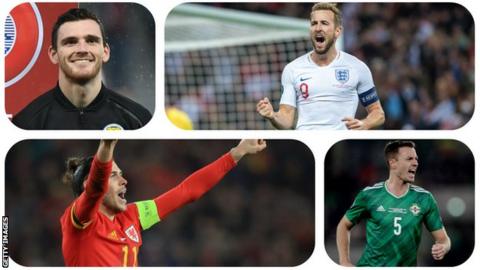
The Euro 2020 draw takes place on Saturday from 17:00 GMT in Bucharest - live on BBC Two - with England and Wales waiting to discover their opponents.
Scotland, Northern Ireland and the Republic of Ireland will also be watching with interest - with all three sides playing in the play-offs next March.
But the unique nature of this tournament - with the qualified countries of the 12 host cities having to be placed in specific groups - means some things have already been decided.
England know which group they will be in - while there are only two options for Wales.
So what do we know - and why? What are the best and worst-case scenarios for the British nations? And how can you follow it?
Who could the home nations face?
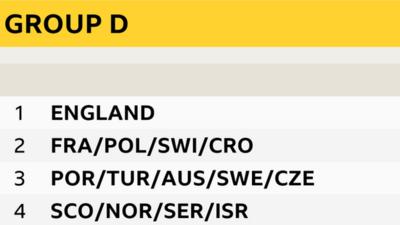
England already know they will be in Group D because Wembley is hosting three games in that group. The winners of Scotland's Euro 2020 play-offs (Path C) will also be in the group.
The Three Lions and Scotland could end up in a group with world champions France and European champions Portugal, because they are among the second and third seeds respectively.
Seeding is based on positions and then points in the qualifying groups, rather than world rankings.
But a kinder draw would see them in with Poland and the Czech Republic, ranked 21st and 43rd in the world respectively. England met the Czechs in qualifying, winning 5-0 at Wembley but losing 2-1 in Prague.
England will host all three of their group games, with Scotland at Hampden Park in their other two games if they qualify. Steve Clarke's side need to get past Israel at home on 26 March and then Norway or Serbia away five days later to qualify.
That means England will not know all their opponents until 31 March. Statisticians Gracenote give Scotland a 19% chance of qualifying, with Norway most likely to progress at 40%.
There are only two groups Wales could be in - A or B.
Group B, which has already been finalised apart from Wales or Finland, would see Ryan Giggs' side in with Belgium, Russia and Denmark.
They beat the first two of those on their way to the Euro 2016 semi-finals and lost twice to Denmark in last year's Nations League.
If they are in Group A - Italy's group - they could end up with the Azzurri, France and Portugal - or Italy, Poland and the Czech Republic.
Simon Gleave, head of sports analysis at Gracenote, says: "There is probably not much difference between A and B for Wales pre-draw. If either the Czech Republic or Austria ended up in Group A though, Wales would not be the outsiders to progress."
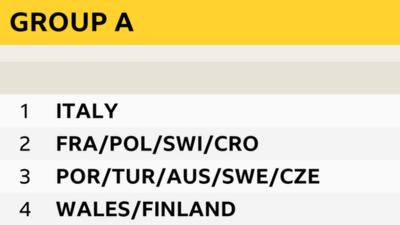
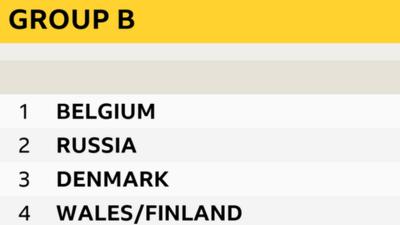
The other home nation still keeping a close eye on the draw are Northern Ireland. They are in the March play-offs, away to Bosnia-Herzegovina in the semi-finals and at home to the Republic of Ireland or Slovakia in the final - if they beat the Bosnians first.
The winners of those play-offs will be in Group E with Spain. Two of their group games will be in Dublin, with the game against Spain in Bilbao.
The most difficult group for Northern Ireland (or the Republic) would see them in with Spain, France and Portugal. The easiest according to the world rankings would be Spain, Poland and the Czech Republic.
Gracenote say Northern Ireland have a 21% chance, with a 16% chance for the Republic of Ireland. Bosnia are clear favourites, with a 39% probability of winning.
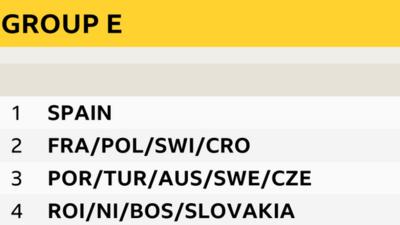
How do the other groups look?
Ukraine and the Netherlands are in Group C, while Germany do not know any of their opponents in Group F yet.
These two groups are linked because Bucharest hosts half the Group C games, with three Group F fixtures in Budapest. But Romania and Hungary are both in the Path A play-offs - so only one can qualify.
If Romania win the play-offs, they will go into Group C with Ukraine and the Netherlands - and the Path D side will be in Group F. If Iceland, Bulgaria or Hungary win Path A they will go into Group F with Germany, with the Path D winner going into Group C.
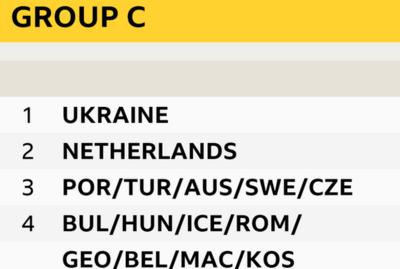
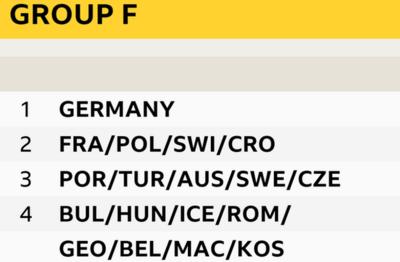
So what are we actually waiting to know?
With the play-off winners not being decided until 31 March, only 11 teams are waiting to find out which group they will be in.
There are four groups France, Poland, Switzerland and Croatia could be placed in - and five possibilities for third seeds Portugal, Turkey, Austria, Sweden and the Czech Republic.
Then Wales and Finland will be in Group A or B.
The draw starts with teams from Pot 1 (ie the top seeds) - although we already know which group each of them will be placed in.
To determine the position of the team in the group - eg A1, A2, A3 or A4 - a ball is drawn from a bowl. This decides the order of who plays when in the group. England's three games are on Sunday, 14 June, Friday, 19 June and Tuesday, 23 June - but they do not yet know when the potential Scotland game would be.
The draw continues with Pot 2, 3 and 4 to decide which group they are in, and then which position of that group they take. That means Wales will not discover their group until nearly the end of the draw.
Why do we know this much already?
So much has already been decided because any hosts who qualify need to be placed in the group that their home games are in. So England and Scotland (if they qualify) have been destined to play in the same group since a random draw on 7 December 2017 - likewise Spain and the Republic of Ireland.
Because four of the top seeds are hosts, their groups are set in stone - so there were only two groups left that the other two top seeds could go in. But Ukraine are not allowed to be in a group with Russia for political reasons (although they could meet in the knockouts) so it means there was only one group they could go in, leaving Belgium in the other.
And with the four play-off winners needing to go in specific groups (even though two of them may be swapped around) it means there are only two possible groups that Wales and Finland - also bottom seeds as the two teams to qualify with the fewest points - can be placed in.
How can I follow the draw?
The draw will be shown live on BBC Two and on the BBC Sport website, alongside a live text commentary, from 17:00 until 18:30 GMT.
Mark Chapman will be presenting with former Wales boss Mark Hughes, ex-England defender Micah Richards and French football journalist Julien Laurens.
The uninterrupted feed of the draw will be available on the BBC Red Button and BBC Sport website.
You can also listen to the draw during Sports Report on BBC Radio 5 Live.
Where are the games?
England benefit from hosting all their group games, as well as the semi-finals and final - so it is possible to map out where all their games would be in the tournament. There is one last-16 tie at Wembley, although Gareth Southgate's side could not play in that one.
The top two teams from each group go through to the last 16, along with the four best third-placed teams. That means only eight teams actually go out in the group stages.
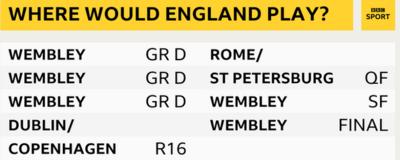
Wales will face at least one trip to Azerbaijan or Russia - with their two possible groups being hosted in Rome-Baku or Copenhagen-St Petersburg.